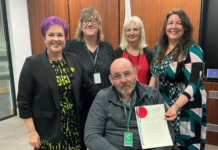
The startup world can be a rollercoaster ride of highs and lows. With 90% of startups not making it past the first year, survival is truly an accomplishment. Here you’ll find advice from 4 startups that have successfully passed the testing stage and are steadily paving their way to growth.
Teamwork makes the dream work
When asked about startups, one of the main things Vitalijus Majorovas, the successful co-founder of Pulsetto at Kilo Health, emphasizes is the importance of having a partner, as being a lone soldier in the field can be challenging. One reason for this is that investors tend to be more suspicious of startups with only one person behind them, making it preferable to start with at least one colleague.
Majorovas exemplifies this principle by having started with a team of 2 people.
As he explains, the ideal scenario is to complement each other’s competencies. Povilas Sabaliauskas, his colleague, serves as the engineer and technical expert, while Vitalijus excels in development, marketing, finance, and sleep science.
However, in the long run, a larger team becomes necessary, as accomplishing too much with just 2 people is challenging. Thus, it becomes crucial to gather a team of amazing, strong professionals, which may even be more critical than having the most original product idea out there.
Ultimately, the key to success lies in having a great idea executed skillfully, with the valuable support of a team of professionals.
“Back then, there were only two of us. I worked on business development while my colleague Povilas worked on the product. Two people make a team, but the possibilities are limited. Additionally, there was a project similar to Pulsetto on the market, but it was complicated, expensive, and not user-friendly. So, we had been working on the concept for a while and knew we needed more resources. Fortunately, I already knew the CEO of Kilo Health, Tadas Burgaila, so we pitched our idea to him. To be honest, the idea was so massive that we think Kilo Health didn’t initially believe it was possible. Still, we agreed to develop a prototype product within 2 months, and we did. That’s when the acceleration began, and the Kilo Health co-found program welcomed us to the team! Typically, it takes 2–3 years to develop a market-ready wearable device, but with Kilo Health’s bold approach and quick decision-making, we were able to produce a market-ready product within 6 months,” explains Majorovas.
Be a matchmaker. Find a market fit
“I didn’t like it when someone told me what to do, so I wanted to create something myself,” says Kasparas Aleknavicius, the co-founder of a dietary supplement, Bioma, at Kilo Health.
Bioma was one of the many ideas by Aleknavicius, but the only one that passed the testing stage until now.
“We had app ideas, other supplement ideas, and looked at many other things in the market, and it became clear that probiotics had the strongest ground. It was a trend, but not one of those weak trends –probiotics remained relevant either way.”
Moreover, what made this product successful was finding a market fit because it directly correlates with the chances of long-term success and sustainability. It helps startups understand who their ideal customers are, their needs, and how they can address them.
“We discovered that many people were struggling with various digestive issues and overall gut health concerns. They were looking for a natural and effective solution to support their gut microbiome and improve their overall wellness.
To address these customer needs, we delved into the realm of probiotics, recognizing their potential to revolutionize gut health.”
Besides that, Aleknavicius says that finding a market fit can give a startup a competitive advantage by offering a better solution than existing alternatives. It can also improve user satisfaction, and they are more likely to become repeat buyers and brand advocates.
Failure is part of the journey. Embrace it
“There was a time when we went all-in, investing heavily and assembling an amazing team. We churned out 5 products full of hope and excitement. However, as time went on, we had to face the reality that some of them weren’t as successful as we had hoped. We had to make the tough call to shut them down because they didn’t meet our goals or gain enough traction,” says Mantas Kondratavicius, the co-founder of BoomeranGo!, at Kilo Health.
Kondratavicius likes to remind people that there are ups and downs in every journey, especially when co-founding a new product.
However, it’s during these moments of struggle that startups can truly gain an understanding of what makes a lasting product. It’s not about cramming in the most features; instead, it’s about skillfully balancing the right elements to create something that succeeds.
“That’s just how it goes when you’re co-founding a business. It’s a rollercoaster ride of successes and failures. You’re in a constant state of creation, where some things soar to new heights while others fall short. I saw an opportunity to make a change by creating a game that would make children feel like they were playing while simultaneously helping them develop healthier habits. And it helped that I had experienced failure before and learned from my mistakes.”
Establish product and sales feedback loops
Aligning the development and selling efforts of a product to work in harmony is also important, says Gytis Labasauskas, the head behind the app Greatness at Kilo Health.
It’s about ensuring that the product being developed meets the needs and expectations of the target market while also having a sales strategy that effectively communicates the product’s value and drives customer acquisition.
“Having a clear value proposition that effectively communicates the unique selling points of your product is crucial. At Greatness, we have a highly skilled sales team that diligently keeps up with the latest updates and market insights. Their dedication ensures that our customers truly find value in our habit-tracking product by seeing it as a tool that fits seamlessly into their lives, helping them build habits that lead to greatness.”
In addition, Labasauskas recommends establishing a feedback loop between sales and product development teams. This means that you catch up and share customer feedback, market trends, and pain points to match them with product updates and upgrades.
About Kilo Health
Kilo Health is a digital health and wellness company with more than 5 million customers worldwide. Since 2021, it has been listed as the second fastest-growing company in Europe on the Financial Times FT 1,000 and the second fastest-growing company in Central Europe on the Deloitte Technology Fast 50 list.
Help keep news FREE for our readers
Supporting your local community newspaper/online news outlet is crucial now more than ever. If you believe in independent journalism, then consider making a valuable contribution by making a one-time or monthly donation. We operate in rural areas where providing unbiased news can be challenging. Read More About Supporting The West Wales Chronicle





















